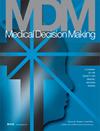Collective Intelligence Increases Diagnostic Accuracy in a General Practice Setting
IF 3.1
3区 医学
Q2 HEALTH CARE SCIENCES & SERVICES
引用次数: 0
Abstract
BackgroundGeneral practitioners (GPs) work in an ill-defined environment where diagnostic errors are prevalent. Previous research indicates that aggregating independent diagnoses can improve diagnostic accuracy in a range of settings. We examined whether aggregating independent diagnoses can also improve diagnostic accuracy for GP decision making. In addition, we investigated the potential benefit of such an approach in combination with a decision support system (DSS).MethodsWe simulated virtual groups using data sets from 2 previously published studies. In study 1, 260 GPs independently diagnosed 9 patient cases in a vignette-based study. In study 2, 30 GPs independently diagnosed 12 patient actors in a patient-facing study. In both data sets, GPs provided diagnoses in a control condition and/or DSS condition(s). Each GP’s diagnosis, confidence rating, and years of experience were entered into a computer simulation. Virtual groups of varying sizes (range: 3–9) were created, and different collective intelligence rules (plurality, confidence, and seniority) were applied to determine each group’s final diagnosis. Diagnostic accuracy was used as the performance measure.ResultsAggregating independent diagnoses by weighing them equally (i.e., the plurality rule) substantially outperformed average individual accuracy, and this effect increased with increasing group size. Selecting diagnoses based on confidence only led to marginal improvements, while selecting based on seniority reduced accuracy. Combining the plurality rule with a DSS further boosted performance.DiscussionCombining independent diagnoses may substantially improve a GP’s diagnostic accuracy and subsequent patient outcomes. This approach did, however, not improve accuracy in all patient cases. Therefore, future work should focus on uncovering the conditions under which collective intelligence is most beneficial in general practice.HighlightsWe examined whether aggregating independent diagnoses of GPs can improve diagnostic accuracy. Using data sets of 2 previously published studies, we composed virtual groups of GPs and combined their independent diagnoses using 3 collective intelligence rules (plurality, confidence, and seniority). Aggregating independent diagnoses by weighing them equally substantially outperformed average individual GP accuracy, and this effect increased with increasing group size. Combining independent diagnoses may substantially improve GP’s diagnostic accuracy and subsequent patient outcomes.集体智慧提高全科诊疗的诊断准确性
背景全科医生(GP)的工作环境不明确,诊断错误十分普遍。先前的研究表明,在一系列环境中,汇总独立诊断结果可提高诊断准确性。我们研究了汇总独立诊断是否也能提高全科医生决策的诊断准确性。此外,我们还研究了这种方法与决策支持系统(DSS)相结合的潜在益处。方法我们利用之前发表的两项研究的数据集模拟了虚拟组。在研究 1 中,260 名全科医生在一项基于小故事的研究中独立诊断了 9 例患者。在研究 2 中,30 名全科医生在一项面向患者的研究中独立诊断了 12 名患者。在这两个数据集中,全科医生在对照条件和/或 DSS 条件下提供诊断。每位全科医生的诊断结果、可信度和工作年限都被输入到计算机模拟中。创建了不同规模(3-9 人)的虚拟小组,并应用不同的集体智能规则(多人、可信度和资历)来确定每个小组的最终诊断结果。结果通过平均权衡独立诊断(即众数规则)的结果大大优于平均个体准确性,而且这种效果随着小组规模的增加而增强。根据置信度选择诊断结果只能略微提高准确率,而根据资历选择诊断结果则会降低准确率。讨论将独立的诊断结果结合起来可能会大大提高全科医生的诊断准确性,并改善患者的预后。然而,这种方法并不能提高所有病例的准确性。因此,未来的工作应侧重于揭示在哪些条件下集体智能对全科医生最有利。利用之前发表的 2 项研究的数据集,我们组成了全科医生虚拟小组,并使用 3 种集体智慧规则(多元性、置信度和资历)合并了他们的独立诊断。通过对独立诊断进行同等权重来汇总诊断结果,其准确性大大超过了全科医生个人的平均准确性,而且这种效果随着小组规模的扩大而增强。综合独立诊断可大大提高全科医生的诊断准确性和患者的后续治疗效果。
本文章由计算机程序翻译,如有差异,请以英文原文为准。
求助全文
约1分钟内获得全文
求助全文
来源期刊

Medical Decision Making
医学-卫生保健
CiteScore
6.50
自引率
5.60%
发文量
146
审稿时长
6-12 weeks
期刊介绍:
Medical Decision Making offers rigorous and systematic approaches to decision making that are designed to improve the health and clinical care of individuals and to assist with health care policy development. Using the fundamentals of decision analysis and theory, economic evaluation, and evidence based quality assessment, Medical Decision Making presents both theoretical and practical statistical and modeling techniques and methods from a variety of disciplines.
 求助内容:
求助内容: 应助结果提醒方式:
应助结果提醒方式:


